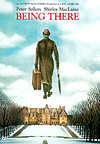Being There (1979)
Warner Home Video
Cast: Peter Sellers, Shirley Maclaine, Melvyn Douglas, Richard Basehart
Extras: Theatrical Trailer, Cast/’filmmaker profiles
Rating:
I miss Peter Sellers. There was something gentle, something very real about his comedic performances. Whether it was the bumbling Inspector Clouseau, the megalomaniac Dr. Strangelove or the Italian master criminal "the Fox" from 1966’s "After The Fox" (a marvelous comedy directed by Vittorio De Sica and written by Neil Simon, not yet available on DVD), he always found the person behind every caricature. He effortlessly skewered the gaps between cultures without falling into stereotypes, comforting us with a veritable United Nations of Mirth. In Sellers’ world, whether we are Italian, French, German, Hindu ("The Party") or plain ol’ Amurrican ("Strangelove’s" President Mirkin Muffley), we are all motivated by the same dreams, plagued by the same flaws and buoyed by the same achievements. In short, as "Brazil’s" Harry Tuttle oft remarked: "We’re all in this together."
1979’s "Being There," adapted from Jerzy Kosinski’s outrageous novella about politics, the media and our national love affair with television, gave us the final great performance of Sellers (he died a year later, the dubious "Fiendish Plot of Fu Manchu" as his actual swan song). Sellers didn’t just play Chance; he was Chance. Before Truman Burbank, before Forrest Gump (more on that connection later), there was Chance the innocent gardener and Chauncey Gardiner, confidant of Washington power brokers and cipher for humanity’s hopes and fears. Not bad for someone with "rice pudding between their ears." Hal Ashby’s remarkable film returns once more via Warner Home Video’s new crisp-looking DVD of this classic satire.
Chance has lived a sheltered life. Completely provided for, all he need do is tend the garden of his benefactor, the "old man," and let the images of mouthwash ads, "Basketball Jones," and morning yoga instructors flow through him. When the old man dies, Chance loses paradise and must fend for himself in a hostile world. An accident lands him in the care of Eve Rand (Shirley Maclaine), wife to Benjamin Rand (Melvyn Douglas), terminally ill philanthropist and casual advisor to President "Bobby" (Jack Warden). Like his name, a series of happenstances quickly transforms Chance from a simple gardener to Chauncey Gardiner, sage visionary quoted by presidents and desired by the rich and powerful. Spinning homilies about "tending the garden," Chauncey affects all in his ever-increasing orbit, completely oblivious of how he just might be the new Adam, the next step on our evolutionary ladder.
Sound crazy? It is. I laughed out loud when I first Kosinski’s slim tome (the book barely runs a hundred pages) twenty years ago. Looking back, his fears of a population mesmerized by the flickering images of the boob tube echoes disturbingly in our post-Jerry Springer, "Real Tales of Survivor Cops" landscape. Yet for all the broad comedic brushstrokes, the film does not ignore the more disquieting undercurrents of Chance’s journey. Take for instance the old man’s maid, Louisa. When she sees Chance rise in prominence, she speaks her mind about what the world has embraced…and what kind of world she’s living in (Chapter 24). In many respects, Forrest Gump is a distant cousin to Chance. But where that film chose to ignore the social (and gender) implications of its seemingly indestructible hero watching both his African-American buddy Bubba and girl friend Jenny succumb to the American Dream, "Being There" explicitly examines that thematic minefield. Remember, this film was released when the average moviegoer didn’t fear ambiguity.
Sellers, Maclaine (at her most appealing), and Douglas (who won an Oscar for the role, winning over Robert Duvall for "Apocalypse Now") all shine here. I would like to also draw attention to the short but effective scene with veteran character actor Richard Basehart. Playing a Soviet attaché just as beguiled as his decadent Western counterparts by the nothingness of Chance, their scene together (Chapters 28 and 29) is a total delight. For a resume that includes performances in Fellini’s "La Strada" and Huston’s "Moby Dick," it’s a dirty shame that Basehart’s career was all but derailed after playing the glum Admiral Nelson on the old "Voyage to the Bottom of the Sea" TV series. (Even there, his ability to make the farfetched believable shined through, rising above the frequently infantile scripts.)
Enough peeks behind the curtain. Part of the fun is experiencing this film fresh.
The 1.85 <$16x9,anamorphic> transfer is better than average but not spectacular. Caleb Deschanel’s cinematography is perfectly in tune with Ashby’s direction, understated and delicate. As such, colors are accurate and consistent without being flashy. Black levels are solid but not deep, leaving some details lost in the shadows. The image is extremely clean and free of blemishes or defects. Edge enhancement is apparent in some scenes, but does not detract from enjoying the film. Fleshtones look natural and I did not detect any compression or digital artifacts during the presentation.
The <$DD,Dolby Digital> mono audio is competent enough, replicating the original mono soundtrack with adequate dynamic range and a minimum of distortion. The music, ranging from Johnny Mandel’s witty piano arrangements, to a very ‘70s Meco rendition of "Thus Spake Zarathrustra," played through the center channel without obscuring the dialogue or clogging the tweeter. In short, you can clearly hear what everyone is saying. Isn’t that the main consideration for a comedy soundtrack anyway?
A theatrical trailer is the disc’s only extra. Presented in <$16x9,anamorphic> <$PS,widescreen>, the trailer is in good physical shape and markets both the extraordinary Sellers and the film’s satiric elements.
The voiceover at the end of the trailer proudly trumpets the film as "Made in the U.S.A.!" Only in America could a Polish author, with the help of an English actor and an American director, write a poison pen love letter that both indicts and absolves. Watch "Being There" on DVD. It’s the next best thing to… well, you know.







